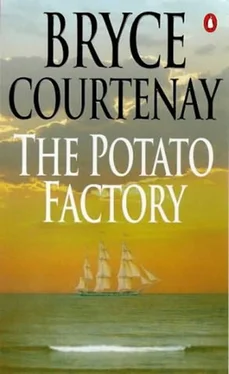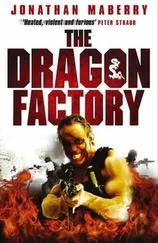Bryce Courtenay - The Potato Factory
Здесь есть возможность читать онлайн «Bryce Courtenay - The Potato Factory» весь текст электронной книги совершенно бесплатно (целиком полную версию без сокращений). В некоторых случаях можно слушать аудио, скачать через торрент в формате fb2 и присутствует краткое содержание. Жанр: Современная проза, на английском языке. Описание произведения, (предисловие) а так же отзывы посетителей доступны на портале библиотеки ЛибКат.
- Название:The Potato Factory
- Автор:
- Жанр:
- Год:неизвестен
- ISBN:нет данных
- Рейтинг книги:3 / 5. Голосов: 1
-
Избранное:Добавить в избранное
- Отзывы:
-
Ваша оценка:
- 60
- 1
- 2
- 3
- 4
- 5
The Potato Factory: краткое содержание, описание и аннотация
Предлагаем к чтению аннотацию, описание, краткое содержание или предисловие (зависит от того, что написал сам автор книги «The Potato Factory»). Если вы не нашли необходимую информацию о книге — напишите в комментариях, мы постараемся отыскать её.
The Potato Factory — читать онлайн бесплатно полную книгу (весь текст) целиком
Ниже представлен текст книги, разбитый по страницам. Система сохранения места последней прочитанной страницы, позволяет с удобством читать онлайн бесплатно книгу «The Potato Factory», без необходимости каждый раз заново искать на чём Вы остановились. Поставьте закладку, и сможете в любой момент перейти на страницу, на которой закончили чтение.
Интервал:
Закладка:
Beat two eggs with a bit of pepper and salt. Add flour until it is a stiff paste. Flour a cutting board, then roll out the paste until it is very thin. Allow to dry for two hours. Now cut the dough into strips about three inches long by one inch wide. Stack and cut again into matchlike strips. Separate them by tossing, and spread them out to dry. Then toss them with boiling chicken soup and boil for ten minutes. Guaranteed to produce first-class farts when added to chicken soup!
New York, Ikey told himself, would have its own Rosemary and Petticoat Lanes, its rookeries with noxious smells and a low-life similar to St Giles, Whitechapel and Shoreditch, and a population composed from rags to riches which seemed to live the one on top of the other. This was the situation in London, Amsterdam and Hamburg and, in fact, wherever European urban Jews could be found. A Jew was not a part-time Jew or a sometime Jew or a non-observing Jew, he was Jewish for the duration of his life. This gave a wandering Jew a strength and unity he could depend on wherever he found a congregation of his own people.
Ikey had not stopped to think that being a Jew also made him accountable to the dictates and rituals of his community. In the matter of being Jewish he was expected to act in a prescribed manner, but not necessarily as a good man. In the good man business, the ritualised and formal nature of the English and European Jewish code of behaviour had allowed the form to become more important than the function, Jewishness being more important than goodness.
Ikey never missed going to the synagogue, where he gained a reputation for being a devout man and an Israelite without guile. In the synagogue each has a separate seat with a box where he deposits his holy books and locks them up until he returns to worship. Ikey frequently made use of his box for the most unhallowed of purposes, concealing within it items which if discovered would have sent him 'across the water' several times over.
Yet Ikey was an excellent example of a pious, if not strictly orthodox, Jew. While he did not observe the dietary laws, mutton stew followed by a dish of curds being his most frequent repast, he never worked on the Sabbath. He paid his tithes, contributed to Jewish charity, took his seat in the synagogue and observed with a full heart Rosh Hashanah, Passover and Yom Kippur.
Therefore it came as a great surprise to him to find that what he had always taken for granted was no longer the case in New York. Being a Jew was none, or very few, of the mystical things he'd always supposed it to be, nor was it any longer the secret satisfaction, despite the eternal suffering of the Jews, to be gained from being one of the chosen people.
The New York Jews neglected the Sabbath and many of them were now taking their rest on Sundays without the slightest show of guilt. The lighting of Sabbath candles and the singing of the Sabbath song was seldom practised. Secular learning of a pragmatic nature was regarded as more important than the study of the Torah. Moreover, philosophical thinking, based on the precepts of freedom and emancipation, was being given precedence over rabbinical discussion. The rebbe was not the centre of the universe nor did he settle all the arguments on behalf of Jehovah. The new Bnai Jeshurun synagogue on Elm Street contained only a handful of worshippers on any given Sabbath morning.
However, if the loss of the rituals and strictures of orthodoxy defined the American Jews, it did not lead to a corresponding loss of ideals, moral misconduct and social irresponsibility. In all this secular speculation, they had not given up a belief in Jehovah or the responsibility of God's chosen people to behave in a moral and honest way. Instead they rejected meaningless ritual and accepted natural goodness as the central tenet of their faith.
To be a good Jew meant to be a good man. What all this amounted to was that Ikey could no longer hide behind his observance of Jewish ritual while continuing to behave in an altogether reprehensible manner. While he had determined to turn over a new leaf in America, this realisation nevertheless came as a profound shock to him.
Ikey was also astonished to find that New York had few poor Jews and that the Jewish community lived openly in the mid-town area spread on both sides of Broadway. New York contained only five hundred Jewish families. Most were American-born and had formed into a community over the past one hundred and fifty years. There was none of the frantic struggle to gain a foothold in a new society or the clash of contradictory cultures between the immigrant and native-born children. The Jews of New York were an established, sober, moral and well-integrated minority population, most of whom had been in America before the War of Independence. They all seemed to know or be on nodding terms with each other, and had excellent business and social relations with their gentile neighbours.
Ikey had timed his arrival badly, for if he had landed in New York ten years later he would have found some forty thousand European Jews in New York, and their numbers would continue to grow hugely for the remainder of the century. The dreadful slums, starvation, poverty and crime of the Lower East Side would come to exist as poor Jewish immigrants came to Goldeneh medina, 'The Golden country'. Alas, in Yiddish Goldeneh medina had a second meaning and was the name also given to a 'fool's paradise', a false gold, bright but worthless.
In this fool's paradise Ikey would have been completely at home. But he was totally at odds with the calm and ordered society he now found himself in, despite his determination to lead a sober and respectable life. Ikey's notoriety had not escaped the notice of the Jews of New York and the tight-knit community immediately closed ranks against him. England's most notorious Jewish criminal was not given a warm welcome. Ikey, despite his apparent wealth and appropriate philanthropy, found himself largely ostracised by his own kind.
Even those contacts to whom he had previously shipped stolen watches and silver objects had conveniently come to see these consignments as having been legitimised by the fact of arriving on American soil. They saw themselves as moral men, albeit practical, who had asked no questions of the origin of the merchandise and so heard no lies, their guilt assuaged.
But while they chose to believe that the stolen merchandise Ikey had sent them had somehow been 'washed' in the Atlantic crossing and thus transformed into honest goods, they were unwilling to accept that, by the act of the same crossing, Ikey had converted from being a criminal to an honest man. They felt morally obliged not to encourage a notorious criminal to establish himself in business in their own city or neighbourhood.
They would not recommend Ikey to wholesalers or to jewellery craftsmen, the greatest majority of whom were Jewish. Diamond merchants would not trade with him and the gold and silversmiths found themselves regrettably short of supplies or lamented that their consignment books were filled with orders beyond their expectations to complete. Despite his offer to pay them in cash, even in gold, their doors were closed to him. The few goods Ikey managed to assemble he sold only to gentiles. His poor selection, together with the used nature of his merchandise, attracted little attention and earned him a reputation not much beyond that of an enterprising pawnbroker.
The only respect Ikey commanded was from the First Manhattan Bank of New York where the manager, wreathed in unctuous smiles, would come out of his office to greet him personally. On the Sabbath, Ikey sat, a stranger in a strange land, alone in the bright new synagogue on Elm Street. The psalms the cantor sung were old, but the feeling of complete and abject loneliness was new.
Ikey had always thought of himself as a loner, a solitary soul who kept his own counsel. In his own eyes, but for his money, he was a worthless person. But now he began to realise that he had lost the human infrastructure, the supporting cast of thieves and shofulmen, card sharps, pimps, whores, actors, street urchins, his Academy of Light Fingers. How he missed the coarse company around a ratting circle, the hustle of Rosemary Lane, the rank humanity of the poor and hopeless, the tinsel and despair of the West End, the pickpockets and swells, beggars and noblemen who made up the street community of his native London.
Читать дальшеИнтервал:
Закладка:
Похожие книги на «The Potato Factory»
Представляем Вашему вниманию похожие книги на «The Potato Factory» списком для выбора. Мы отобрали схожую по названию и смыслу литературу в надежде предоставить читателям больше вариантов отыскать новые, интересные, ещё непрочитанные произведения.
Обсуждение, отзывы о книге «The Potato Factory» и просто собственные мнения читателей. Оставьте ваши комментарии, напишите, что Вы думаете о произведении, его смысле или главных героях. Укажите что конкретно понравилось, а что нет, и почему Вы так считаете.












